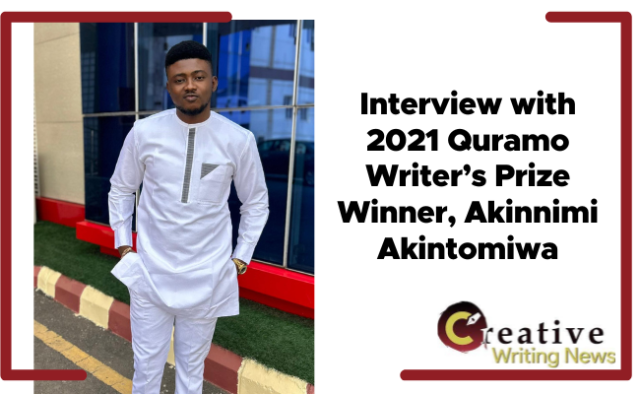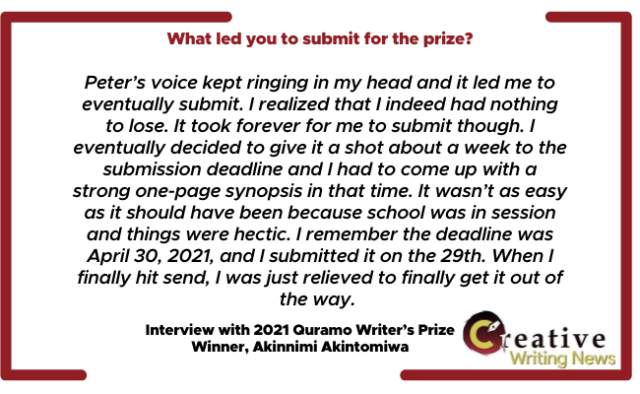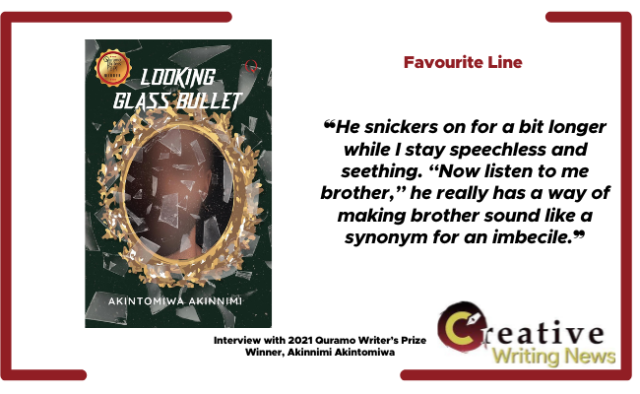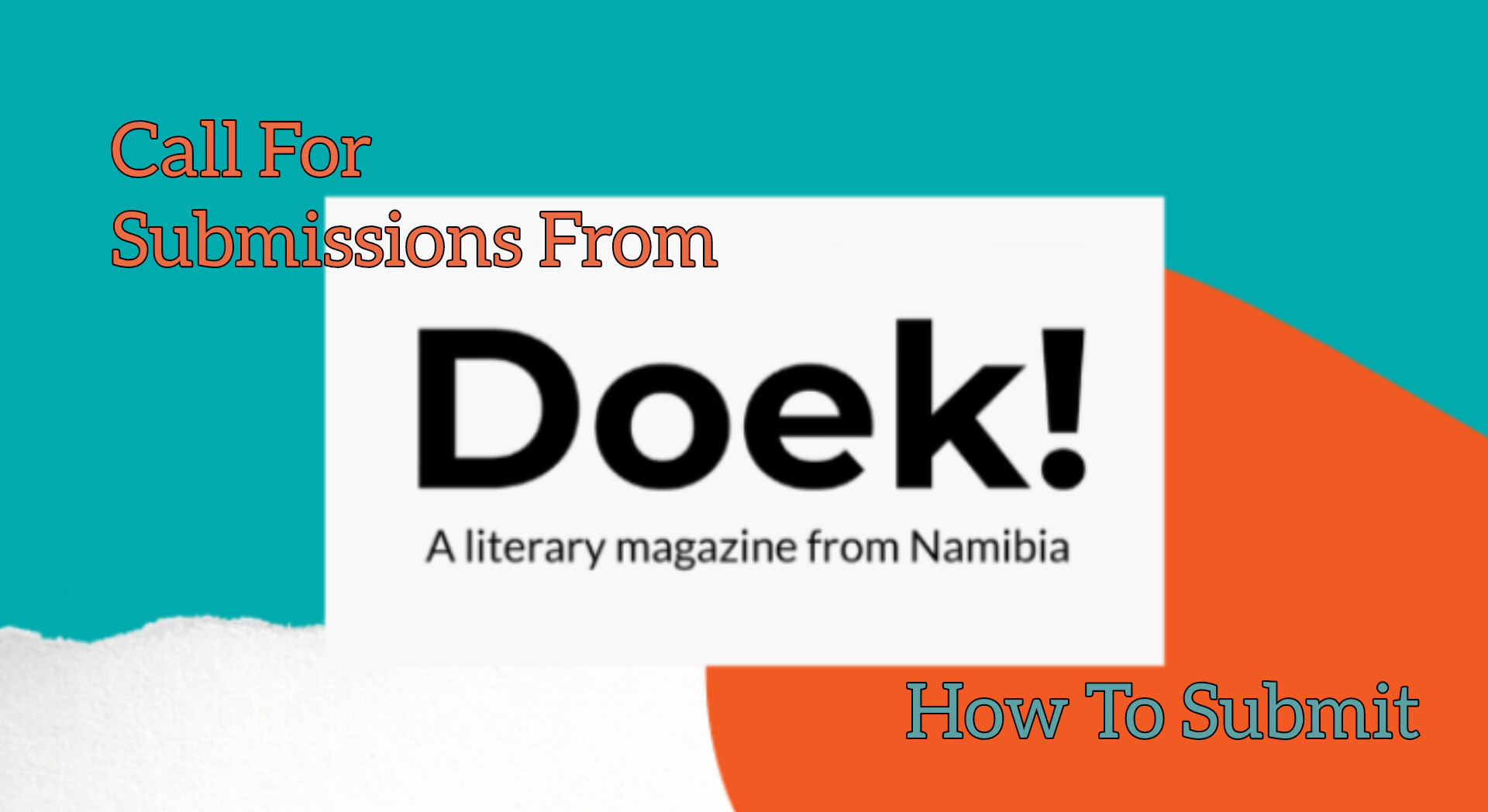❝I was really pessimistic about my chances❞— An Interview with Quramo Writer’s Prize Winner, Akintomiwa Akinnimi
In 2021, on the Quramo Festival stage, three judges announced a then-medical student story as the winner of the Writer’s Prize. Currently, Akintomiwa Akinnimi is a graduate of Medicine and Surgery from Obafemi Awolowo University, Ile-Ife, Osun State. He has been writing all his life, and his writing mostly consists of think pieces and other works of non-fiction. With his distinct and daring style of writing on Medium and Twitter, he attracted a sizeable number of followers. He shares his non-fiction writing through social media platforms while championing the cause of African creativity through the 49th Street, a Pan-African media outlet where he is a founding member. He believes in the supremacy of music as a form of artistic expression and releases songs under the alias Louis Hendrixx.

Our Interview with him highlighted what it was to be a first-time submitter, creating a story people can connect with and why you should definitely take the chance on hitting the send button too, pessimistic or not.
How did you find out about the Quramo Writers Prize?
I found out about the competition through my good friend, Peter Aladeyelu. He was well aware that I had written the novel during the long pandemic months. So, when Quramo made the announcement, he forwarded the link to me. He also kept on encouraging me to submit my novel. I was quite pessimistic about it but he kept asking me “what do you have to lose?”
Was your submission a complete work already by then?
The entire book was completely ready. Finished. I was hoping to push the novel independently as an e-book, so I had it ready. It was also my second draft. The pandemic left me with all the time in the world, I was able to work on a second draft, which I was quite satisfied with. So yeah, I submitted that one.
What led you to submit for the prize, and how did you feel when you hit send?
 Peter’s voice kept ringing in my head, and it led me to eventually submit. I realized that I indeed had nothing to lose. It took forever for me to submit though. I eventually decided to give it a shot about a week before the submission deadline, and I had to come up with a strong one-page synopsis at that time. It wasn’t as easy as it should have been because school was in session and things were hectic. I remember the deadline was April 30, 2021, and I submitted it on the 29th. When I finally hit send, I was just relieved to finally get it out of the way.
Peter’s voice kept ringing in my head, and it led me to eventually submit. I realized that I indeed had nothing to lose. It took forever for me to submit though. I eventually decided to give it a shot about a week before the submission deadline, and I had to come up with a strong one-page synopsis at that time. It wasn’t as easy as it should have been because school was in session and things were hectic. I remember the deadline was April 30, 2021, and I submitted it on the 29th. When I finally hit send, I was just relieved to finally get it out of the way.
What was writing your winning story like?
It was one of the best experiences of my life. I loved every second of it. That story was my first-ever attempt at writing fiction. The idea for the book had been in my head for several months, but it was a different experience fleshing out a vague idea to a full story. Many times, it felt like I was watching the story come to life and the characters develop more than I was actually writing it. The fact that I didn’t know how the book was going to end at the time I started writing it made it all the more enthralling. I literally wrote that story in freestyle mode, not knowing how but absolutely trusting that it would make sense in the end.
How long have you been writing?
My first memory of writing was in primary school. Primary 6, to be precise. I have been writing since then. It has mostly been think pieces, though. I’ve always loved to do social commentary, so most of my writing has been in that direction. To avoid the cruel, unforgiving hands of sapa, I have also had to do a lot of freelance writing across various niches.
What is your winning story about, and Why did you want to write it?
Looking Glass Bullet is a story about a man who has his entire life thrown upside down when someone tries to assassinate him and he’s forced to take refuge in a stranger’s home for days. The sudden attempt on his life forces him to introspect and he comes to many ugly realizations about himself. After a few days in hiding, he finally embarks on his mission to uncover the identity of the person who wants him dead while trying to correct the many wrongs he had done in the past.
I wrote the story because I strongly believe people need to view themselves through the eyes of others to have a complete profile of who they truly are. There’s this popular opinion that you shouldn’t care what anyone thinks of you, and you should just do you regardless. I think it’s nonsense because who you are dictates what you do. And what you do affects others and that in turn affects their relationship with you and can come full circle to affect you. If someone sees you as a bad person, they could deny you important opportunities. Or, as in the case of my main character, they could try to kill you. So, should you really just do you without giving a damn what people think? A business needs feedback to improve. In the same way, we can use feedback – what people think of us – to be better.
And we definitely shouldn’t wait till someone tries to kill us before we take the steps towards being better.
You mentioned wrote your book in 2020, was there any shuffling between other activities and writing the story?
Luckily for me, there was not much shuffling to be done. I wrote the story during the pandemic so I had absolutely nothing else to do. It helped a great deal because I had no choice but to focus on writing the story.
When you were announced as the winner, what did it feel like? Can you put it to words how you felt?
It’s hard to put such a moment into words. I was a nervous wreck all through QFest because the Quramo Writer’s Prize is structured in such a way that it’s really winner-takes-all. The runners-up just get recognition. Like I said, I was really pessimistic about my chances so getting to the top 10 felt like a huge achievement already. About 350 books were submitted that year so I was pretty proud of myself. Then the list was reduced to 5 and I was still in the race. Optimism began to creep in at that point and I just knew I’d be heartbroken not to win. So, I hoped and prayed. The moment the CEO announced my manuscript as the winner, a wave of relief hit first, and then the elation started to creep in slowly till it climaxed some hours later.
What do you think the judges admired about your story? How does it connect with readers?
It was definitely the character development. Not to toot my own horn, but the main character was convincing. He starts off as someone really despicable and grows into a self-aware and repentant person towards the end. So, you hate him at the start, pity him towards the middle, then root for him at the end. During the session we had with the head judge, Jude Idada, on the first day of the Quramo Festival, he praised the character development of the story multiple times. I think that was my first clue that my book had a good chance of winning.
My book is one that the average reader can easily connect to. I wrote with a focus on dialogue so I think it helped improve the pacing of the book, kept things uptempo and engaging. A great example of how the dialogue kept readers locked in was during the final day of QFest. We all had to pick a scene from our book to read to the audience. I picked a part where the main character called his worst enemy who just happens to be his brother to accuse him of sending an assassin after him.
When the other four contestants read their parts, there wasn’t much engagement from the audience. So, I expected the same reception. I read head down, not looking at the audience so their inattentiveness wouldn’t discourage me. Imagine my shock when I heard them react to a particular line. And the next one, and the one after that. I couldn’t believe they were listening that closely! So yeah, anyone who reads my book can expect to connect with some really fun dialogue. There are also a lot of twists and turns in there to keep readers guessing and locked in. Down to the last page of the book when you think it’s all resolved, I still managed to introduce a final bit of chaos. Hence, I’m sure readers will really connect to the mystery around the identity and motivation of the villain.
Can you share a favorite line from your story?
 This is taken from a dialogue between the main character, Samuel Adeniyi-Jones and his brother, Michael. For context, the only emotion they feel towards each other is the purest form of hate on God’s green earth.
This is taken from a dialogue between the main character, Samuel Adeniyi-Jones and his brother, Michael. For context, the only emotion they feel towards each other is the purest form of hate on God’s green earth.
‘He snickers on for a bit longer while I stay speechless and seething. “Now listen to me brother,” he really has a way of making brother sound like a synonym for an imbecile.’
I really like this line because the idea of someone pronouncing a word in a way that completely transforms the meaning is really funny to me. I keep imagining how the word “brother” would be pronounced in a movie adaptation of this book. What would it actually sound like? Also, although it seems trivial, this pronunciation of the word “brother” marks an important point in the character’s development towards the end of the story. You would have to read the full book to grasp what I mean.
What tips would you give other writers hoping to submit to this year’s Quramo Writers Prize?
One, be true to your style. That entails writing in the way that comes most naturally to you, no matter how unorthodox it might seem to the next person. Two, the genre you read most will likely be the genre you write best, so play to your strengths. It’s good to explore your range but if you’re going to win the QWP or any other competition for that matter, my advice is for you to stay in your comfort zone. Three, master writing a synopsis. Quramo gets hundreds of submissions so they are only going to invest their time reading the full story if the synopsis is promising. It’ll be a shame for your awesome story to be thrown out because of a subpar synopsis.
What is your next step after being a winner of the Quramo Writers Prize?
The famous next step question. I definitely have more stories in me. I especially want to write a dystopian series and get to build my own world. But considering my other commitments, it’ll take a while before I can find the time to do that. But the time will definitely come.
Finally, do you have an unpopular opinion about writing?
My unpopular opinion is that writers invest more words into setting the scenery than they need to. Maybe I feel this way because i naturally skip those type of details when I read. No, I don’t need to know if the table is mahogany or if the tree it was made from stood tall for over 500 years, unless of course it’s absolutely integral to the story in some way. My philosophy for setting scenes is to only give the essential details and let the readers’ imagination handle the rest. And the funny thing is that’s exactly what’s going to happen anyway. Give five paragraphs of description if you please but the reader will still imagine what they want anyway. So why waste so many words then?
Thank you very much for your words and advice, especially for everyone looking to submit for this year’s Quramo Writer’s Prize Competition. You can connect with Akinnimi Akintomiwa on his X (FKA Twitter) Page.





